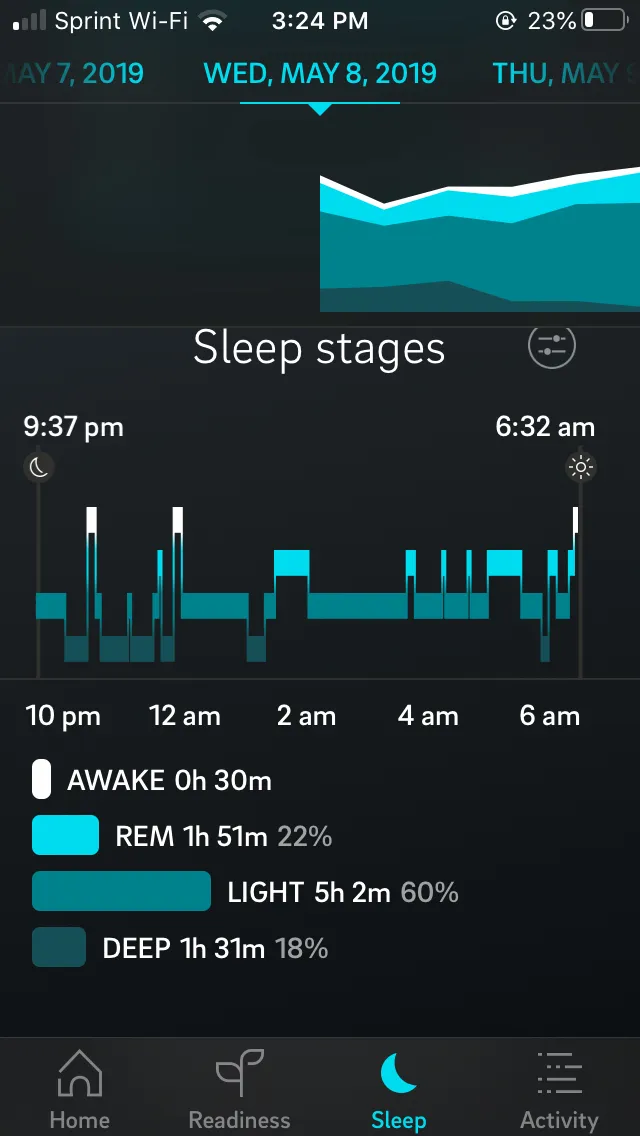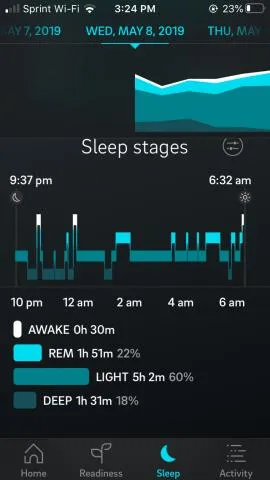
Measure it to Own It
If you were to ask me what my greatest health challenge was, I would have answered you with clarity and assurance, “I am just not a very good sleeper.” I might explain my different strategies and interventions and supplements that I experiment with, all to improve my sleep quality. I might even have offered you the diversion my patients frequently try on me: “I come by it naturally, my mother wasn’t a good sleeper.”
I decided 2019 was going to be the year I improved my sleep, for real, for good. I had listened to enough discussion to know what I should be doing, I just wondered why it wasn’t working. Some nights I couldn’t fall asleep, other nights I was up several times. I often slept great on vacation, but worried over my restless nights when I was home.
I also knew that the OURA ring is believed to be the best wearble health tracker, modeled in the picture above. It measures your heart rate, the steps you take, and much more, cleverly hidden with its proprietary functions. When you go to sleep it somehow “knows” when you are absolutely asleep, how much of the night is spent in deep sleep, light sleep and REM sleep. I bought myself that OURA ring for my birthday!
Given my primary interest in brain health, I wanted to see that I got at least SOME deep sleep. Deep sleep is when we clean out the debris from the day, saving what should be saved, and making room for new memories the following day. About 60-90 minutes is average, but I warned myself that deep sleep usually declines with age, but hey, maybe I’d get 30-45 minutes. And most importantly, then I’d have something to work with!
The ring has tiny sensors next to your skin and all night records … something… In the morning, place your ring next to your open smart phone Oura Ring app and amazing, it tells you what kind of a night you had.

Imagine my surprise!! There were my middle of the night pee-breaks, and there was the suggestion, undeniable, that I had actually enjoyed 91 (not just 90!!) minutes of deep sleep. Looking back on the night, I was able to remember the “white” sections where I was absolutely awake, up and stumbling through my dark room, to the adjacent bathroom. Perhaps I remembered a tiny fragment of a dream, but almost two hours of REM sleep, no way!! and best of course was the reassurance that I spent a good long time in deep sleep.
Turns out that was one of my better nights that week (look ahead to where the dark part of the graph almost disappears a couple of days later!) and certainly my sleep has continued to fluctuate.
I notice that I get the best nights when I:
- get at least SOME exercise, just enough, not too much and not too late,
- finish eating at least two, preferably three, hours before bed,
- refrain from excessive evening excitement,
- go offline about 3 hours before bed, and leave the TV at least 2 hours before bed,
- I can have a little bit of alcohol, the earlier the better, and beer seems to be the most soporific.
- It helps if I have done something like meditation some time during the day, not necessarily in the evening but that’s good if it’s been a busy day,
- and if I am not close to sleep when I head to bed, the best thing I can do is read, with one dim light in the room, a book–but not just any book. I sleep best when I read, or actually re-read, a well-written slow-paced book that distracts me just enough from my own brain, but demands from me only appreciation, not full-on intrigue!
We have since purchased two sizes of OURA rings for use in our office. We let people check them out for a few days, and do their own “better-than-a-sleep-study” evaluation in their own home without involving their insurance company’s paperwork. (A real sleep study gives a lot of other and quite valuable information, but for simply seeing the quality of your sleep and seeing how that quality responds to the intervention of your choice, the OURA ring is great!
What about you, how well do you sleep and what do you do to improve your sleep?

